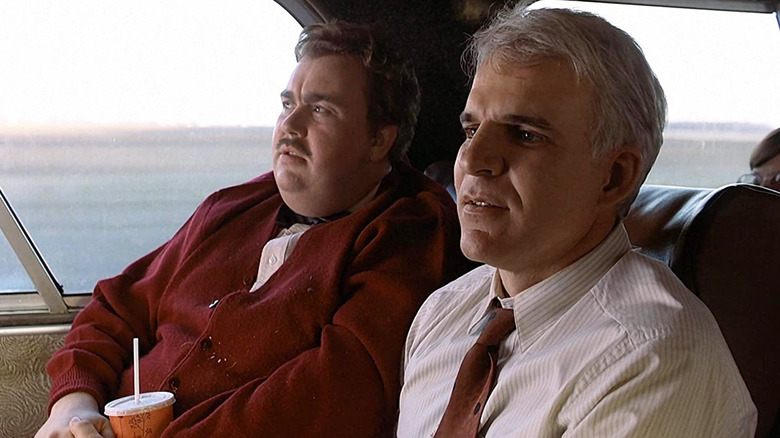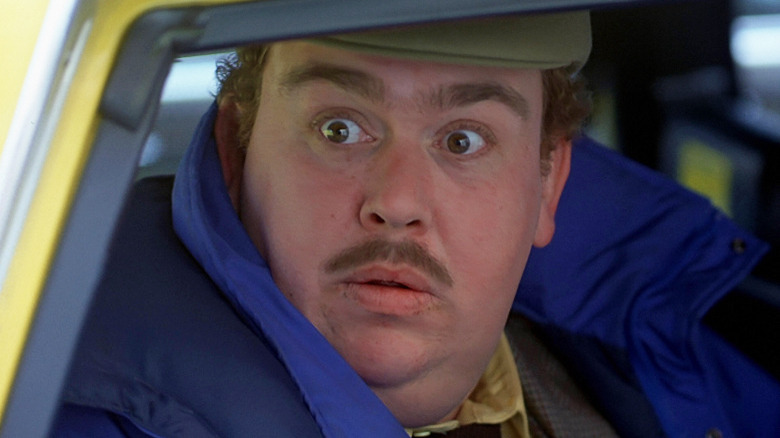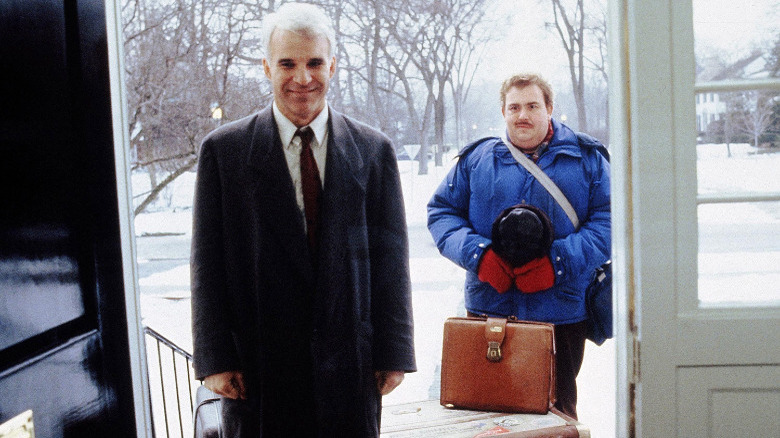Steve Martin Can't Understand Why John Hughes Trimmed Down This Planes, Trains And Automobiles Scene
Long before he donned a pork pie hat to solve crimes on "Only Murders in the Building," Steve Martin wore a fedora to travel the country in 1987's "Planes, Trains and Automobiles." The beloved John Hughes comedy has since become a Thanksgiving fixture for a lot of families, which is pretty wild when you recall there's a famous scene where Martin drops almost 20 f-bombs in the span of a minute (why yes, I did count them when I watched the movie as a kid). Not to mention, it's a film where his and John Candy's characters nearly die a horrific death after driving the wrong direction on a freeway, and Martin gets pulled off the ground by a certain part of his anatomy.
Martin stars as Neal Page, an uptight ad executive whose efforts to make it back home to Chicago in time to spend Thanksgiving with his family are both aided and sabotaged by Del Griffith (Candy), a traveling salesman with a big heart and an equally big mouth. Part road trip farce, part buddy movie, Hughes deftly threads the needle with his script, merging crude comedy and slapstick with some incredibly moving scenes of emotional vulnerability. There are times when the film shows its age, of course, like a scene that gives rise to a gay panic joke. Still, it's aged far better over the last 35 years than many of Hughes' other live-action '80s comedies.
While discussing the film in an interview with The Guardian in August 2021, Martin admitted there was one scene he wished Hughes had left in its original scripted form:
"I was looking through the script the other day, because I was finding things that were cut from the movie that were so poignant. Right at the end, there's a scene between me and John [Candy] and he explains his life ... that scene was a page and a half long in the script and in the movie I think it's cut to three lines. But there was such beauty in it and I never understood why John [Hughes] trimmed that scene."
John Candy's lost monologue
"Planes, Trains and Automobiles" ends with Neal and Del finally arriving in Chicago before parting ways on good terms. Riding the train home, Neal reflects on the ups and downs of the pair's road trip, laughing at the absurdity of it all. A lightbulb goes off in his head when he recalls Del's hesitancy to discuss his home life, and he races back to the station where he left Del — who he finds sitting there, alone. When Neal gently asks why he's still there, Del admits he no longer has a home, and his wife Marie (whom he's spoken of fondly in the past) passed away eight years ago.
After that, the film cuts to Neal taking Del home to spend Thanksgiving with him and his family. However, John Hughes originally wrote and shot an additional exchange in-between those two, which is the one Steve Martin was referring to. The scene, which is really an extended monologue delivered by John Candy, finds Del telling Neal about his life on the road in a coffee shop. He explains he "didn't have much family" and planned to have kids with Marie before she died. Del adds that the holidays are hardest on him, stating:
"I don't get to give any of myself to anybody. It's not the getting I miss, it's the giving. I sat on that plane with you and I thought about you heading home to be with your people. And Tuesday night when you were in the shower and I looked at the picture of your kids, man, I thought you gotta be the luckiest man on Earth to go home and put those little guys on your knee and hug 'em and kiss 'em. I'm thirty-nine years old and I never had that and... I never will. I'm sorry about all this. I just kinda lost control this time. Every year since Marie's been gone, I've gotten closer and closer to losing it. Usually, I head for a church. I can feel like I'm part of something when I'm in a church. This time... I guess I didn't get to the church fast enough. I just couldn't let go.
"I vowed I'd never burden anybody with this. And I broke my vow, held you away from your family. Caused you a hell of a lot of trouble. You better run."
Sometimes less is more
For all his comedic talents, John Candy excelled at bringing sincerity and emotional depth to the table when his roles called for them. He memorably does this early on in "Planes, Trains and Automobiles" when Neal chews Del out for being insufferable to travel with, delivering his famous "I like me" speech. There's no doubt in my mind Candy would have also killed Del's deleted monologue about losing Marie and how he's struggled to make his way since then. It's only natural that Steve Martin would have a hard time grasping why John Hughes cut it, having gotten to watch Candy perform the scene in-person.
That being said, I not only get why Hughes decided to drop this scene, I actually agree with his choice. Sometimes, less really is more, and I would argue that's the case here. The specific details of his backstory aside, this deleted scene doesn't reveal much about Del as a person (or what motivates him to behave the way he does) that you can't intuit on your own from watching the final version of the film. There's also something powerful about the way the movie cuts from Del telling Neal the truth at the train station (prompting Neal to slowly nod his head, his expression a mix of understanding and guilt) to the pair of them quietly carrying Del's trunk as they walk to Neal's home together.
If anything, it's too bad this deleted scene has never been made widely available to the public, just so everyone could experience it for themselves. But even without that, Hughes' tale of a road trip from hell remains a comedy classic in its own right.


